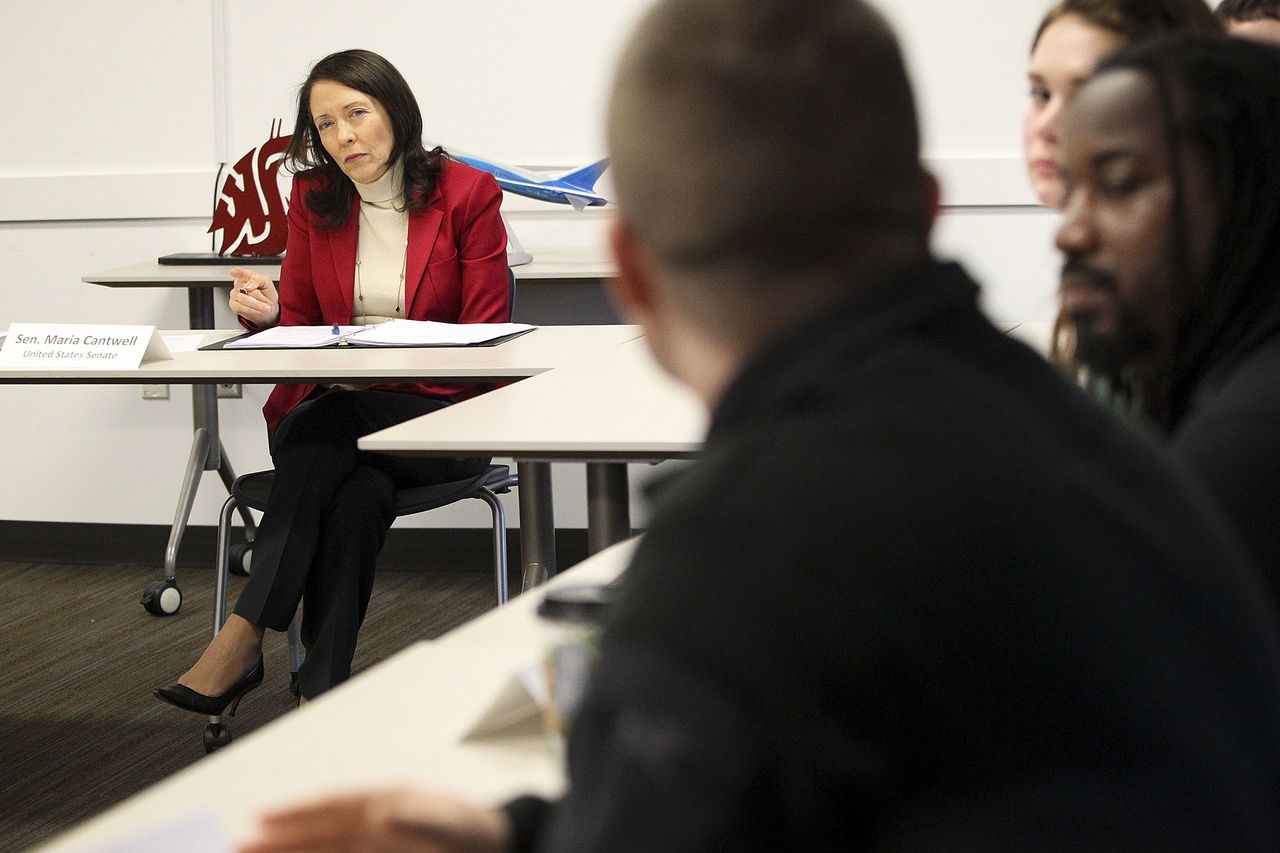EVERETT — It’s not just the cost of loans that make college a financial hardship.
It’s the Rube Goldberg-like maze of regulations on financial aid, including some specific to veterans, that can slow a student’s progress and add to out-of-pocket costs. And there’s add-on costs, such as electronic textbooks priced at $50 but with an online charge to access the book adding $150 to the tab.
These were among the points made by students meeting with U.S. Sen. Maria Cantwell, who came to the Everett Community College campus on Friday. She said she wanted to hear directly from community college and Washington State University North Puget Sound students about barriers to higher education.
Michael Austin, who is pursing a degree in electrical engineering, told of commuting from Bremerton to attend classes. Students who attend both EvCC and WSU classes on the campus can’t get financial aid to take classes at two schools at the same time, he said.
“You can only qualify for one institution at a time,” he said. This has meant paying nearly $2,000 out of pocket to take needed classes, Austin said.
Mark Walsh said he served in the Air Force for 12 years. He started his associate’s degree in the fall of 2012 and finished last summer.
Veterans can only receive benefits for 36 months of schooling, he said. Walsh figures it will take him a total of five years of classes to complete a bachelor’s degree, in part due to some of the classes he’s taken being on the quarter system and some on semester. Taking a class for two quarters is spread over more weeks than one class for a semester, he said.
“I want to get into robotics and that can translate into any field,” he said. “I love microprocessors.”
Cantwell said that although work has been done on federal legislation regarding higher education benefits for veterans, “it looks like we need to work on the 36-month issue.”
Cantwell said that the Running Start program, which allows high school students to earn college credits, might be a way for students to save money.
Kellen Syth told Cantwell that as a high school student growing up in Snohomish, “we couldn’t pay for the gas to get me here.”
Syth said that he’s working two part-time jobs to pay and is considering getting a third while enrolled as a full-time student. That’s because of financial aid limits on the amount of money given to students younger than 24 years old who aren’t married, veterans or homeless, he said. “Federal loan limits have caused me to be in a bad situation,” he said. “I’m tapped out.”
Austin Johnson, an EvCC student, said he hopes to transfer to a university to earn a microbiology degree. He said he participated in the Running Start program for two years, graduating from high school with college credits. “I wanted to go to a university,” he said.
Federal loan applications look not only at a family’s income but the educational degrees of parents, he said. Although both his parents have Ph.Ds, the form doesn’t take into account the debt that came with his mother’s diagnosis of Stage 4 colon cancer, which has prevented her from working, he said.
Johnson said he hasn’t been able to get any federal loan assistance. He said he spent $800 on books required for two fall quarter classes and has maxed out his credit card.
Cantwell, a Democrat who worked at RealNetworks in Seattle before being elected to Congress, said she hopes ways can be found to drive down the costs of providing digital textbooks for students. “We shouldn’t hold people back if we can have some content in some cheaper version,” she said.
At the end of the session, Cantwell told the students: “You surprised me.” She said she expected to hear about high loan debt.
“We will definitely try streamlining the federal loan process to make it easier and more affordable,” she said.
“Nobody paints the picture better that you on how challenging this is,” Cantwell aid. “We need to learn from you.”
Sharon Salyer: 425-339-3486 or salyer@heraldnet.com.
Talk to us
> Give us your news tips.
> Send us a letter to the editor.
> More Herald contact information.

























